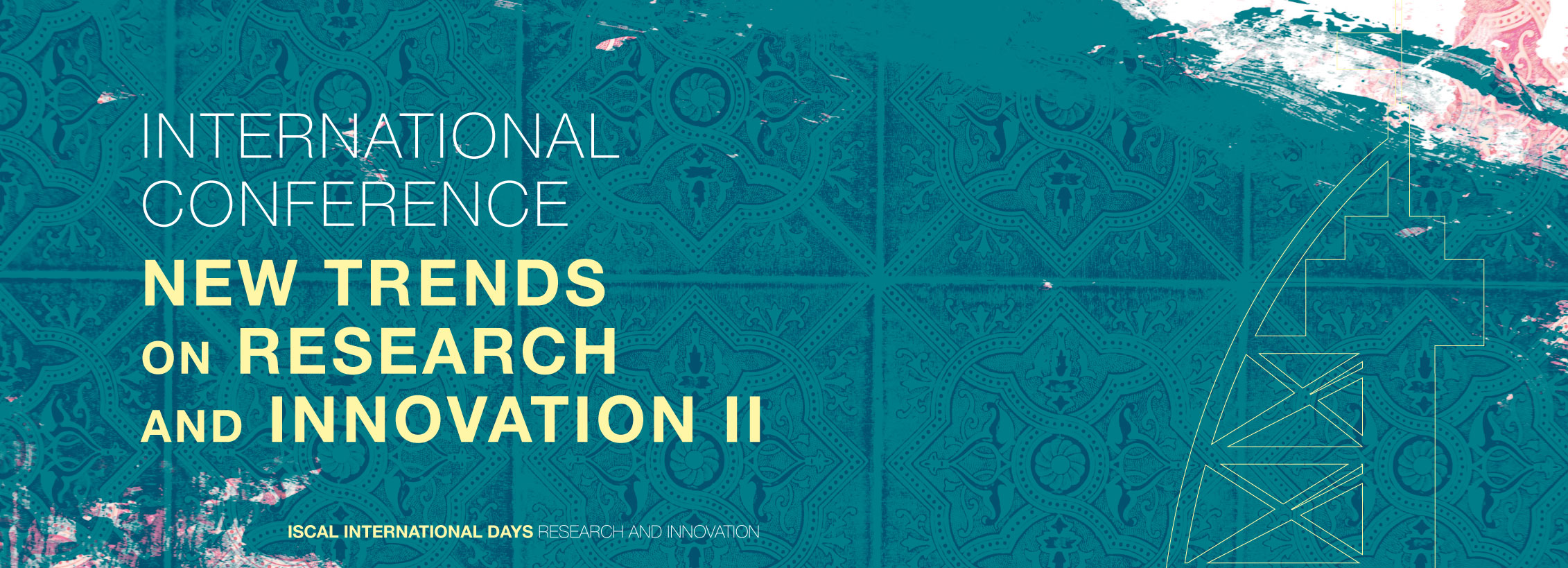A Conferência Internacional ‘New Trends on Research and Innovation II’ integrante da Terceira Edição do evento ISCAL International Days realiza-se no dia 03 de abril de 2025.
PROGRAM
09h00
Conference registration and welcome
09h30
Opening of the Conference
10h00 | 1st Panel
Chair: Pedro Pinheiro - ISCAL
1. The gig economy and moral emotions
Michelle Moraes; Orlando Gomes; Bruno Tomás, ISCAL
2. GSHR Sustainability
Natacha Ornelas; Teresa Esteves - ISCAL; Lígia Nascimento - ISMAT, Manuela Faia Correia, Maria Teresa Ribeiro - Universidade Lusíada
3. Governance of Charities in Scotland and Portugal
João de Sousa Assis, ISCAL
4. Investment Decision Biases in High Net Worth Individuals
Philipp Schreiber, Esslingen University
5. Have Your Cake and Eat It: In pursuit of ethically driven, profitable institutional investment strategies
Susanna Gibbons, University of Minnesota / Carlson School of Management / Finance Dept.
11h15 | Coffee break
11h30 | 2nd Panel
Chair: José Luís Silva - ISCAL
1. Explore and Manage Partnership in the Knowledge Exchange World
Jane Ning, Edinburgh Napier University
2. The ´Aha!` Moment: Watching Creativity and the Role of Observatories at Higher Education Institutions (HEIs) by the Powerholders` Perception
Margarida Piteira, ISCAL
3. Fostering engagement in higher education: digital strategies for active learning
Maria João Ferro; Alberto Gómez Bautista; Ana Sofia Carvalho, ISCAL
4. Business Process Management drives Digital Transformation
Uta Maria Mathis, Esslingen University of Applied Sciences
5. Growing trend of a more accessible research?
Tereza Emond Kunert, Edinburgh Napier University
13h00 | Lunch break
14h00 | 3rd Panel
Chair: Cristina Pereira Pedro - ISCAL
1. The relevance of Innovation and Internationalization strategies for HEIs success
Marina Antunes, ISCAL
2. The relevance of necessary arbitration in consumer protection
Elionora Santos, ISCAL
3. Tandem Internship Model: Fostering Professional Growth
Jyrki Rajala; Anni-Maija Viitasaari, Centria UAS
4. Pollution of Agricultural Lands and Innovative Approaches to Their Restoration
Lubov Moldavan; Olena Pimenowa, Institute of Economics and Forecasting of National Academy of Sciences of Ukraine; University of Economics and Human Sciences in Warsaw
5. The Crisis in Food Market and Thailand’s Competition Law
Ploykaew Porananond, Faculty of Law, Chiang Mai University
15h15 | Coffee break
15h30 | 4th Panel
Chair: João Rosário - ISCAL
1. Employment contract and subordination
Dina Cilia, ISCAL
2. The role of Human-AI Collaboration in Sustainable Work Environment: The Mediating Role of Ethical Governance
Francesca Di Virgilio, University of Molise/Department of Economics
3. Regulation and Quality: Analysis of the Perception of Architecture in Differently Regulated Urban Environments
Josef Klement, Prague University of Economics and Business
4. Artificial intelligence in the prevention of occupational risks: regulatory challenges and opportunities
Marlene Ferreira Mendes, ISCAL
5. Challenges in the Enforcement of Thailand's Personal Data Protection Law: An Economic Analysis of Law Using Principal-Agent
Theory Watcharapol Siri, Faculty of Law, Chiang Mai University
16h45 | 5th Panel
Chair: Hélder Fanha Martins - ISCAL
1. Opportunities offered by new assistive technologies for persons with disabilities and the challenges of exceptions and limitations of the international copyright system
Anna Bober-Kotarbinska,WSB Merito University in Gdansk (Poland)
2. The principle of Pay or Consent and its consequences on the constitutional protection of human personality
Elena di Carpegna Brivio, Università di Milano-Bicocca
3. Portugal’s Public Sector Wage Bill Evolution (1986–2023): Austerity, Structural Reforms, and Fiscal Sustainability
João Alcobia, ISCAL
4. Smart Specialization and Sustainable Innovation: Lessons from the EREI 2030 in Alentejo
Maria Luísa Silva, ISCAL
5. Family challenges vis à vis the company
Cecília Morais, ISCAL
18h30
Closing of the conference
Contamos com a presença de todos/as os/as interessados/as e esperamos que esta experiência enriquecedora represente uma aprendizagem e um desenvolvimento de competências, assim como a criação de memórias a todos/as os/as participantes.





